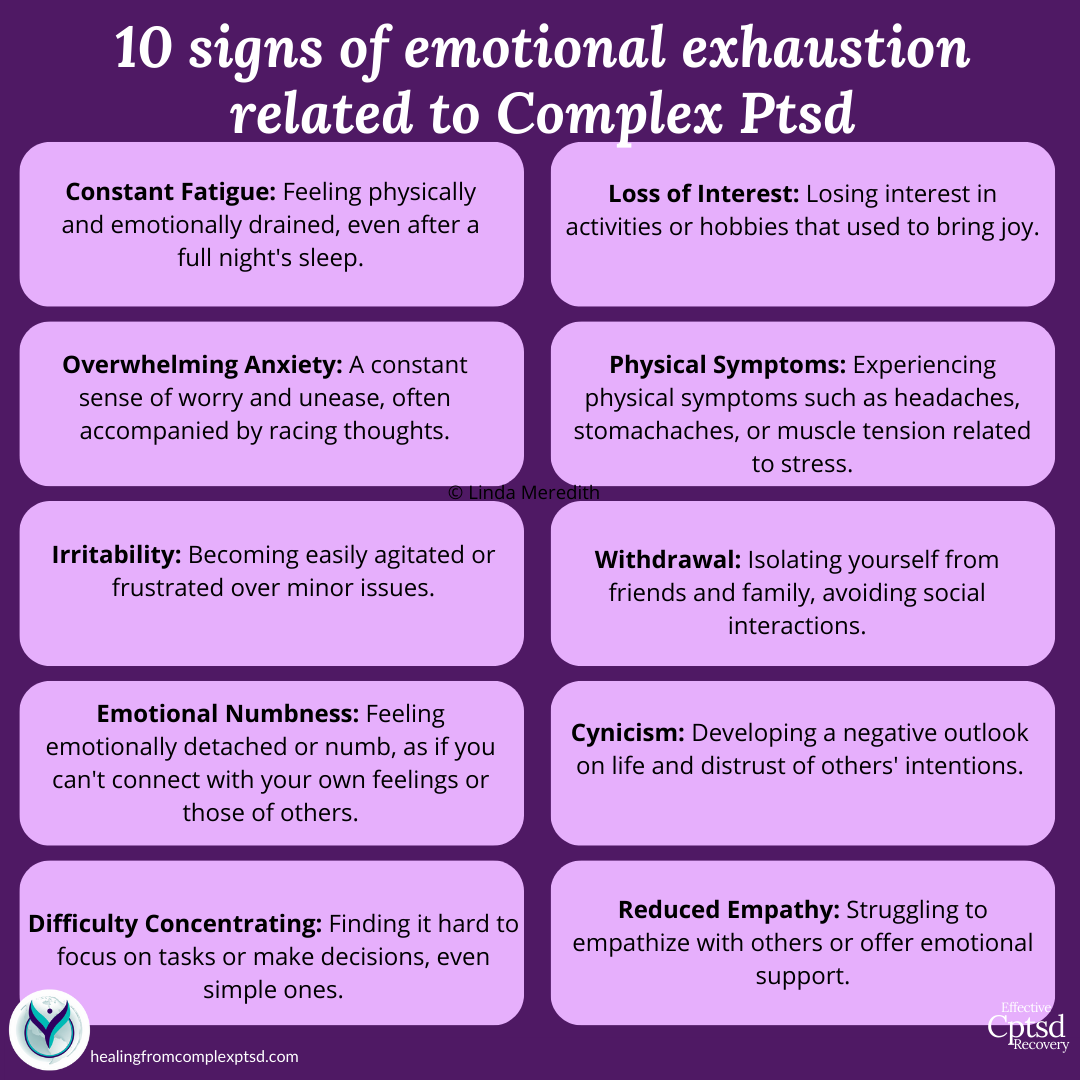Complex PTSD (C-PTSD) is an advanced form of Post-Traumatic Stress Disorder, often caused by prolonged exposure to traumatic experiences. One common symptom of C-PTSD is emotional exhaustion, a state of intense mental and emotional fatigue that can significantly impact one's quality of life. In this blog post, we'll delve into the 10 signs of emotional exhaustion related to C-PTSD and explore strategies for both clients in recovery and coaches working with such clients.
- Persistent Fatigue: A constant feeling of being tired, regardless of rest.
- Irritability: Uncharacteristically quick to anger or frustration.
- Social Withdrawal: Isolating oneself, even from close family and friends.
- Reduced Productivity: Struggling to accomplish daily tasks or work.
- Overwhelm: A feeling that even small tasks are insurmountable.
- Increased Emotional Sensitivity: Heightened emotional responses, such as crying easily.
- Feeling Hopeless or Despondent: Pervasive sense of hopelessness about the future.
- Physical Symptoms: Physical aches and pains without a clear medical explanation.
- Decreased Motivation: A lack of enthusiasm or drive to accomplish goals.
- Impaired Judgment: Making poor decisions due to emotional or mental clouding.

Acknowledge the Exhaustion: Recognize and validate your experience. Understanding that emotional exhaustion is a symptom of C-PTSD can reduce self-blame.
Prioritize Self-Care: Schedule time for activities that rejuvenate your spirit, whether it's reading, walking, or meditating.
Set Boundaries: Make it clear to others what you can and can’t handle emotionally and physically.
Consult Healthcare Providers: Medication and therapy can be valuable tools in your recovery journey.
Stay Physically Active: Exercise releases endorphins, which can combat symptoms of depression and anxiety.
Seek Support: Whether it's a trusted friend, family member, or support group, don’t underestimate the power of a strong support network.
Assessment Tools: Utilize appropriate tools to assess the severity of your client’s emotional exhaustion.
Customized Coping Strategies: Each client is unique; personalize coping strategies based on their needs.
Psychoeducation: Educate your client about the neurological and psychological aspects of C-PTSD and emotional exhaustion.
Encourage Incremental Progress: It’s essential to celebrate even the small victories, as they can lead to increased motivation and self-esteem.
Stay Updated with Research: Complex trauma is an evolving field. Keeping current will enable you to offer the most effective interventions.
Mindfulness Techniques: Encourage mindfulness as a way to stay anchored in the present, reducing anxiety and hyper-vigilance.
Avoid Retraumatization: Be aware of potential triggers and sensitivities to avoid inadvertently causing harm.
Collaborate with Other Healthcare Providers: Often, a multidisciplinary approach is most effective in treating C-PTSD.
Supervision and Self-Care for Coaches: Emotional exhaustion can be contagious. Make sure you are also taking steps to prevent burnout.
Review and Adjust: Regularly evaluate the effectiveness of your approach and be prepared to make adjustments.
While it’s crucial for clients to take an active role in their recovery, the guidance and support of a well-informed coach can be instrumental in navigating the challenges of C-PTSD. The relationship between coach and client is a partnership; each has a role to play in overcoming emotional exhaustion.

